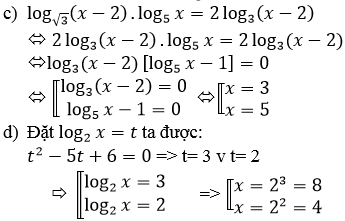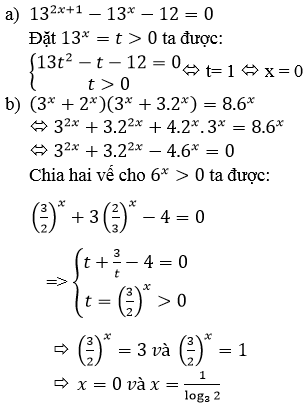Hãy nhập câu hỏi của bạn vào đây, nếu là tài khoản VIP, bạn sẽ được ưu tiên trả lời.

Điều kiện \(\begin{cases}x\ne1\\x>\frac{1}{2}\end{cases}\)
\(\log_3\left(x-1\right)^2+\log_{\sqrt{3}}\left(2x-1\right)=2\Leftrightarrow2\log_3\left|x-1\right|+2\log_3\left(2x-1\right)=2\)
\(\Leftrightarrow\log_3\left|x-1\right|\left(2x-1\right)=\log_33\)
\(\Leftrightarrow\left|x-1\right|\left(2x-1\right)=3\)
\(\frac{1}{2}\)<x<1 và \(2x^2-3x+4=0\)
hoặc x>1 và \(2x^2-3x-2=0\)
\(\Leftrightarrow x=2\) thỏa mãn điều kiện. Vậy x=2

Điều kiện x>0.
Phương trình đã cho tương đương :
\(\log_3\left(x^2+2x\right)-\log_3\left(3x+2\right)=0\)
\(\Leftrightarrow\log_3\left(x^2+2x\right)=\log_3\left(3x+2\right)\)
\(\Leftrightarrow x^2+2x=3x+2\)
\(\Leftrightarrow x^2-x-2=0\)
\(\Leftrightarrow\begin{cases}x=-1\\x=2\end{cases}\)
Đối chiếu điều kiện ta có phương trình đã cho có nghiệm là \(x=2\)

Điều kiện \(x^2-1>0\Leftrightarrow\left|x\right|>1\)
Bất phương trình tương đương với :
\(\log_3\log_{\frac{1}{2}}\left(x^2-1\right)<\log_3\Leftrightarrow0<\log_{\frac{1}{2}}\left(x^2-1\right)<3\)
\(\Leftrightarrow\log_{\frac{1}{2}}1<\log_{\frac{1}{2}}\left(x^2-1\right)<\log_{\frac{1}{2}}\frac{1}{8}\Leftrightarrow1>x^2-1>\frac{1}{8}\)
\(\Leftrightarrow2>x^2>\frac{9}{8}\)
\(\Leftrightarrow\sqrt{2}>\left|x\right|>\frac{3}{2\sqrt{2}}\) (Thỏa mãn)
Vậy tập nghiệm của bất phương trình là \(D=\left(-\sqrt{2};\frac{-3}{2\sqrt{2}}\right)\cup\left(\frac{3}{2\sqrt{2}};\sqrt{2}\right)\)

a. Vì \(0< 0,1< 1\) nên bất phương trình đã cho
\(\Leftrightarrow0< x^2+x-2< x+3\)
\(\Leftrightarrow\left\{{}\begin{matrix}x^2+x-2>0\\x^2-5< 0\end{matrix}\right.\)
\(\Leftrightarrow\left\{{}\begin{matrix}\left[{}\begin{matrix}x< -2\\x>1\end{matrix}\right.\\-\sqrt{5}< x< \sqrt{5}\end{matrix}\right.\)
\(\Leftrightarrow\left\{{}\begin{matrix}-\sqrt{5}< x< -2\\1< x< \sqrt{5}\end{matrix}\right.\)
Vậy tập nghiệm của bất phương trình là \(S=\left\{-\sqrt{5};-2\right\}\) và \(\left\{1;\sqrt{5}\right\}\)
b. Điều kiện \(\left\{{}\begin{matrix}2-x>0\\x^2-6x+5>0\end{matrix}\right.\)
Ta có:
\(log_{\dfrac{1}{3}}\left(x^2-6x+5\right)+2log^3\left(2-x\right)\ge0\)
\(\Leftrightarrow log_{\dfrac{1}{3}}\left(x^2-6x+5\right)\ge log_{\dfrac{1}{3}}\left(2-x\right)^2\)
\(\Leftrightarrow x^2-6x+5\le\left(2-x\right)^2\)
\(\Leftrightarrow2x-1\ge0\)
Bất phương trình tương đương với:
\(\left\{{}\begin{matrix}x^2-6x+5>0\\2-x>0\\2x-1\ge0\end{matrix}\right.\) \(\Leftrightarrow\left\{{}\begin{matrix}\left[{}\begin{matrix}x< 1\\x>5\end{matrix}\right.\\x< 2\\x\ge\dfrac{1}{2}\end{matrix}\right.\)
\(\Leftrightarrow\dfrac{1}{2}\le x< 1\)
Vậy tập nghiệm của bất phương trình là: \(\left(\dfrac{1}{2};1\right)\)

a) Đặt t = 13x > 0 ta được phương trình:
13t2 – t – 12 = 0 ⇔ (t – 1)(13t + 12) = 0
⇔ t = 1 ⇔ 13x = 1 ⇔ x = 0
b)
Chia cả hai vế phương trình cho 9x ta được phương trình tương đương
(1+(23)x)(1+3.(23)x)=8.(23)x(1+(23)x)(1+3.(23)x)=8.(23)x
Đặt t=(23)xt=(23)x (t > 0) , ta được phương trình:
(1 + t)(1 + 3t) = 8t ⇔ 3t2 – 4t + 1 = 0 ⇔ t∈{13,1}t∈{13,1}
Với t=13t=13 ta được nghiệm x=log2313x=log2313
Với t = 1 ta được nghiệm x = 0
c) Điều kiện: x > 2
Vì nên phương trình đã cho tương đương với:
[log3(x−2)=0log5x=1⇔[x=3x=5[log3(x−2)=0log5x=1⇔[x=3x=5
d) Điều kiện: x > 0
log22x – 5log2x + 6 = 0
⇔(log2x – 2)(log2x – 3) = 0
⇔ x ∈ {4, 8}

a)ĐK: 2x+1>0
\(\log_3\left(2x+1\right)=2\log_{2x+1}3+1\)
\(\Leftrightarrow log_3\left(2x+1\right)=2.\frac{1}{log_3\left(2x+1\right)}+1\)
Nhân \(log_3\left(2x+1\right)\)cả 2 vế
Đặt \(t=log_3\left(2x+1\right)\)
\(\Leftrightarrow t^2-t-2=0\)
\(\Leftrightarrow\left[\begin{array}{nghiempt}t=2\\t=-1\end{array}\right.\)\(\Leftrightarrow\left[\begin{array}{nghiempt}2x+1=9\\2x+1=\frac{1}{3}\end{array}\right.\)\(\Leftrightarrow\left[\begin{array}{nghiempt}x=4\\x=-\frac{1}{3}\end{array}\right.\)nhận cả 2 nghiệm
b)ĐK x>0
\(\Leftrightarrow1+log^2_{27}x=\frac{10}{3}log_{27}x\)
Đặt \(t=log_{27}x\)
\(\Leftrightarrow t^2-\frac{10}{3}t+1=0\)
\(\Leftrightarrow\left[\begin{array}{nghiempt}t=3\\t=\frac{1}{3}\end{array}\right.\)\(\left[\begin{array}{nghiempt}x=27^3\\x=3\end{array}\right.\)

\(\log_{\frac{1}{2}}\left(4^x+4\right)\ge\log_{\frac{1}{2}}\left(2^{x+1}-3\right)-\log_22^x\)
\(\Leftrightarrow\log_{\frac{1}{2}}\left(4^x+4\right)\ge\log_{\frac{1}{2}}\left(2^{x+1}-3\right)+\log_{\frac{1}{2}}2^x\)
\(\Leftrightarrow\log_{\frac{1}{2}}\left(4^x+4\right)\ge\log_{\frac{1}{2}}\left(2^{2x+1}-3^x\right)\)
\(\Leftrightarrow4^x+4\le2^{2x+1}-3.2^x\)
\(\Leftrightarrow4^x-3.2^x-4\ge0\)
\(\Leftrightarrow\begin{cases}2^x\le-1\left(L\right)\\2^x\ge4\end{cases}\)\(\Leftrightarrow x\ge2\)
Vậy bất phương trình có tập nghiệm \(S=\left(2;+\infty\right)\)

a) Tập xác định của hàm số là :
\(D=\left(-\infty;-4\right)\cup\left(4;+\infty\right)\)
b) Tập xác định của hàm số là :
\(D=\left(1;+\infty\right)\)
c) Hàm số xác định khi và chỉ khi \(\begin{cases}x^2-3x+2\ge0\\\sqrt{x^2-3x+2}+4-x\ge1^{ }\end{cases}\) \(\Leftrightarrow\) \(x\le1\) V \(x\ge2\)
Tập xác định là \(D=\left(-\infty;1\right)\cup\left(2;+\infty\right)\)
d) Hàm số xác định khi và chỉ khi
\(\begin{cases}\left|x-3\right|-\left|8-x\right|\ge0\\x-1>0\\\log_{0,5}\left(x-1\right)\le0\\x^2-2x-8>0\end{cases}\) \(\Leftrightarrow\) \(\begin{cases}\left(x-3\right)^2\ge\left(8-x\right)^2\\x>1\\x-1\ge1\\x<-2,x>4\end{cases}\) \(\Leftrightarrow\)\(x\ge\frac{11}{2}\)
Vậy tập xác định là \(D=\left(\frac{11}{2};+\infty\right)\)





Điều kiện : \(x>\frac{3}{4}\)
\(\Leftrightarrow\log_3\left(4x-3\right)^2-\log_3\left(2x+3\right)=2\)
\(\Leftrightarrow\log_3\frac{\left(4x-3\right)^2}{2x+3}=2\)
\(\Leftrightarrow8x^2-21x-9=0\)
\(\Leftrightarrow x=3\) hoặc \(x=\frac{-3}{8}\)
Đối chiếu điều kiện ta được nghiệm \(x=3\)